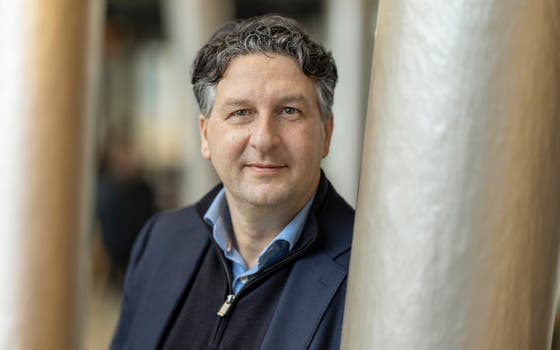Jeffrey Beekman: It can be faster

Jeffrey Beekman, professor of Disease Models for several years, 'finally' delivered his oration on 14 February. The delay was partly due to the pandemic, but the title was 'It can be faster' with a cause. And that did not only apply to his oration, but Beekman made a special plea for faster adoption of models to help patients faster.
Beekman began his speech by noting that many drugs are developed for an 'average' patient, while everyone is unique and may react differently to those drugs. That personalised approach requires better disease models that can predict the success of treatment for an individual patient.
In doing so, these models can also help drug development by providing earlier insight into the success rate of new drugs. The high failure rate of candidate drugs is one of the causes of expensive medication.
From molecule to human
Jeffrey Beekman also looks back at Utrecht's role in focusing on personalisation. For every genetic disease, there is an error at the molecular level, namely an error in the DNA. That error prevents cells from functioning properly, causing tissues to also have problems and eventually to patient. According to Beekman, understanding the 'molecular machine' is essential to help the patient.
In Utrecht, Beekman could learn from big names who were exploring this molecular world, and benefit from a breakthrough in disease modelling from the start: the development of organoids. These organoids or mini-organs can be grown from cells of any individual - diseased or healthy. They show the functioning of a tissue at the cellular level, and thus have proven to be a valuable tool in studying both healthy and diseased people.
The first clinical application of organoids
Beekman developed the first clinical application of organoids for people with cystic fibrosis. By growing organoids from these people, it is now possible to quickly see which drugs work for this specific person - a big win in cystic fibrosis, which has many causes and drugs.
But Beekman, ten years after developing this test, is critical of the healthcare system. The test is still not approved for use, which means it cannot be applied worldwide. The slow response from government, insurers and regulation is a big reason for the title of Beekman's oration: it can be faster.
What else can be done faster?
Collaboration at the UMC Utrecht goes smoothly for Beekman. He works closely with Professor in Paediatric Pulmonology Kors van der Ent, for example, and they complement each other well as researchers and clinicians. In Beekman's view, these transdisciplinary teams are important for quickly translating research into clinical applications that can help patients.
As icing on the cake, personal models of disease can also reduce animal testing, and provide a new economic spearhead for the Utrecht region. But, Beekman argues, then it really all needs to happen a bit faster. After all, it can be done faster.
Photo: Ed van Rijswijk
